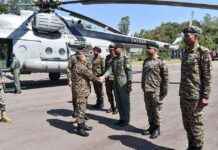India-Pakistan tensions escalated on Wednesday as Maharashtra Navanirman Sena (MNS) chief Raj Thackeray criticized India’s Operation Sindoor, calling it futile. Thackeray questioned the necessity of targeting a “ruined nation” like Pakistan, which he believes is already in a state of disarray. The operation, carried out on March 6 and 7, resulted in casualties on both sides, with eight individuals killed and 35 others wounded.
Thackeray expressed his disapproval of using war as a response to terror attacks, citing examples from the United States where targeted strikes were preferred over full-blown military engagements. He raised concerns about the lack of security measures in tourist-heavy areas and emphasized the need for thorough combing operations instead of relying solely on airstrikes. Thackeray also criticized Prime Minister Modi for seemingly prioritizing political engagements over addressing national security threats.
Operation Sindoor, launched by the Indian armed forces, aimed to dismantle terrorist infrastructure sites in Pakistan and Pakistan-occupied Kashmir (PoK) following a deadly attack in Pahalgam. The strikes were carefully planned to avoid provoking a larger conflict while holding those responsible for the attack accountable. The operation sparked international attention and diplomatic tensions between India and Pakistan, with both countries asserting their positions on self-defence and retaliation.
As tensions simmered between the two nations, Thackeray’s remarks added a layer of criticism towards the government’s handling of the situation. His call for more strategic security measures and a focus on counter-terrorism efforts resonated with many who shared concerns about the escalating hostilities. The aftermath of Operation Sindoor saw political debates and public discourse on the efficacy of military strikes versus diplomatic solutions.
The timing of the operation, amidst Prime Minister Modi’s engagements in Bihar and Kerala, raised questions about the government’s priorities during a crisis. Thackeray’s questioning of these decisions reflected a broader sentiment of skepticism towards political leaders and their handling of national security matters. The need for a more comprehensive approach to security threats, including intelligence gathering and proactive measures, became a focal point in the discussions following the operation.
Despite the criticisms and doubts raised by Thackeray and others, the Indian government maintained its stance on the necessity of Operation Sindoor in response to the terror attack in Pahalgam. The measured approach taken by the armed forces was seen as a calculated response to a grave security threat, balancing the need for retaliation with the goal of preventing further escalation. The aftermath of the operation underscored the complexities of cross-border conflicts and the challenges of navigating geopolitical tensions in the region.
Overall, Thackeray’s comments added a critical perspective to the ongoing discussions surrounding India-Pakistan relations and the use of military force in response to security threats. As the dust settled on Operation Sindoor, the need for a comprehensive strategy to address terrorism and regional instability remained a pressing concern for policymakers and the public alike. The path forward in resolving the underlying issues between the two nations remained uncertain, with the specter of further escalations looming large in the minds of many.

















